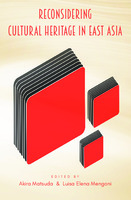Reconsidering Cultural Heritage in East Asia
Contributor(s)
Elena Mengoni, Luisa (editor)
Matsuda, Akira (editor)
Language
EnglishAbstract
The concept of ‘cultural heritage’ has acquired increasing currency in culture, politics and societies in East Asia. However, in spite of a number of research projects in this field, our understanding of how the past and its material expressions have been perceived, conceptualised and experienced in this part of the world, and how these views affect contemporary local practices and notions of identity, particularly in a period of rapid economic development and increasing globalisation, is still very unclear. Preoccupation with cultural heritage - expressed in the rapid growth of national and private museums, the expansion of the antiquities’ market, revitalisation of local traditions, focus on ‘intangible cultural heritage’ and the development of cultural tourism - is something that directly or indirectly affects national policies and international relations. An investigation of how the concept of ‘cultural heritage’ has been and continues to be constructed in East Asia, drawing on several case studies taken from China, Japan and Korea, is thus timely and worthwhile.
Keywords
east asia; korea; heritage; monuments; japan; china; Cultural heritage; History of ChinaDOI
10.5334/bazISBN
9781909188891;9781909188907;9781909188914OCN
972045533Publisher
Ubiquity PressPublisher website
https://www.ubiquitypress.com/Publication date and place
2016Classification
Asia
The arts: general topics
History
Society and culture: general
Sociology and anthropology


 Download
Download Web Shop
Web Shop